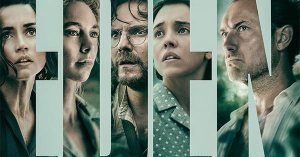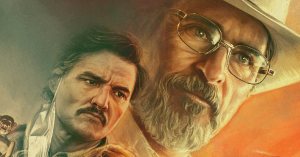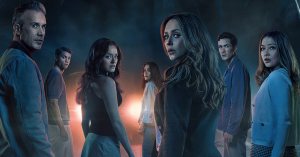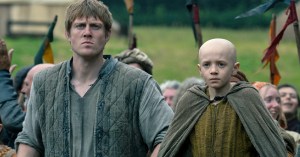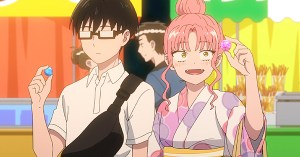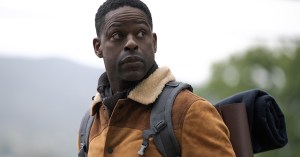Five Favorite Films with Morgan Spurlock
The director of POM Wonderful Presents: The Greatest Movie Ever Sold chats with RT.
West Virginia native Morgan Spurlock didn’t attend film school thinking he would become the maverick documentary filmmaker he’s recognized as today. But when the award-winning playwright and creator of MTV’s I Bet You Will stumbled upon a news report about an obesity lawsuit that was brought against McDonald’s, he came up with a bold idea that would capture the American zeitgeist in a way that few others ever had before. Spurlock’s 2004 doc Super Size Me proved to be a critical success, touching on timely health issues ranging from school nutrition to fast-food marketing practices, and earned an Oscar nomination for Best Documentary Feature.
This week, Spurlock expands further on one of Super Size Me‘s themes in his latest documentary, POM Wonderful Presents: The Greatest Movie Ever Sold. Once again utilizing the personal, hands-on approach, Greatest Movie‘s meta-narrative follows the adventurous director as he attempts to secure sponsorship funds for a film all about product placement in movies, often with hilarious and eye-opening results. Spurlock recently chatted with RT to give us his Five Favorite Films and to talk about the various quirks involved in the process of making Greatest Movie. Read on for his list and the full interview.
A Face in the Crowd (1957, 91% Tomatometer)
My favorite movie of all time is a film by Elia Kazan called A Face in the Crowd. I just love that movie. It’s one of those films that, any time it’s on, I’m stuck. I’m literally stuck in front of the TV, watching it until it’s over. I just think it’s just a brilliant commentary. It stars Patricia Neal, Andy Griffith, Walter Matthau, and it’s this amazing look at the impact and power of television. He made this film at the end of the ’50s, and even today, it’s as relevant and as powerful and as impactful as it was fifty years ago.
Brother’s Keeper (1992, 100% Tomatometer)
My second favorite film, I would probably say my most favorite documentary of all time, is a film called Brother’s Keeper by Joe Berlinger and Bruce Sinofsky. Those are the same guys who did Paradise Lost and Metallica: Some Kind of Monster. Brother’s Keeper is this amazing film about a brother who was murdered, and it’s this omniscient journey as the murder gets uncovered and the investigation is happening. You know, they take one of the brothers to court, and the story just unfolds in front of you in a way that’s so twisted and bizarre and weird. This, for me, represents what a great documentary does. It just kind of unfolds in front of you in a way you can’t expect.
The Shawshank Reemption (1994, 88% Tomatometer)
I love The Shawshank Redemption. Another one of those movies that, if that movie’s playing, I’m stuck in front of the television for hours. I am so in love with that film.
It Happened One Night (1934, 97% Tomatometer)
I love It Happened One Night, which was… I’m trying to remember what year that was; was it 1929? But it was just this great, fantastic kind of screwball comedy, like one of the first real romantic comedies, and I think it was also like the first film to win all of the major academy awards. I’m a big Capra fan; I ove Frank Capra’s movies. That film really resonated with me when I saw it. Any chance I ever have to see that is great. I actually saw it in a movie theater once, and it was such a great experience. To see classic movies like that in a movie theater, it’s an opportunity that you rarely have. I really love that.
Scanners (1981, 76% Tomatometer)
My fifth film — it’s the movie that literally got me wanting to make movies to begin with — is the David Cronenberg film Scanners. When I was a kid, I was a little weird kid, and I loved horror films, I loved gore films. When Michael Ironside made that guy’s head explode in that movie, I was like, “Whatever this is, I want to do this!” I was ten, eleven years old, and my parents would take me to see these. Like, I saw The Exorcist in movie theaters; I saw The Evil Dead in a movie theater. I went to see all this crazy, freaky s*** that you would never take a little kid to see today. But I saw Jaws in a movie theater. Like, I wanted to see all these scary movies, and my parents were like, “Absolutely. Let’s go.”
And so here I was, as a teenager, learning how to make my own blood, and my own scars and wounds. I wanted to be Rick Baker or Tom Savini. When I was a kid, that’s who I looked up to. When I saw An American Werewolf in London, it was phenomenal, to see all those makeup special effects they were doing. And then when I went to high school and learned you could actually go to college to study film and learn how to make movies, I was like, “I’m in. That’s exactly what I want to do.”
Were your parents just particularly lenient, or…?
[laughs] My parents just kind of let me watch anything as a kid. You know, I remember when we got cable, and suddenly there was naked people on HBO. It was big deal back in ’79, ’80. But my parents were like, “Look, we’d rather you watch anything you want and then talk to us about it.” So if I wanted to go see a warped movie, or a crazy movie, they’d be like, “Yeah, come on. Let’s go. I’ll take you to see that.” And they were just really open with things. My parents loved the arts and were big supporters of the arts and were really encouraging of anything that me and my brothers wanted to do. Yeah, my mom and dad were — they still are — awesome people.
Next, Spurlock talks about how he came up with the idea for Greatest Movie, how his sponsors reacted to his film, and Ralph Nader’s sense of humor.
RT: Let’s talk about Greatest Movie. So, Super Size Me was born when you read about a lawsuit that was brought against McDonald’s by two girls. Was there a similar moment that spawned the idea behind Greatest Movie Ever Sold?
Morgan Spurlock: Oh, absolutely. I loved the TV show Heroes. When that show came on, Season 1 of Heroes, I evangelized about it. I told everyone, “This is the greatest thing you?re going to see on TV. It’s phenomenal.” And you know, I even kept watching into Seasons Two, Three, Four, as the wheels literally were falling off the bus. But, you know, I think it’s in the second season, where it’s already kind of started to fall apart, they started to put this product placement in the show. There was this scene where Hayden Panettiere is coming out of school, and she’s talking to her dad, and like, her birthday’s coming up, and her dad says, “Honey, your mom and I are really proud of you. I got a surprise for you.” And he reaches into his pocket, and as he does, the camera goes to the front of the car, and you see the Nissan logo. The camera cuts back to her, she’s holding the keys in her hand, rapid focus on her face , and she goes, “The Rogue? The Nissan Rogue? Oh my god, daddy, I can’t believe you’re giving me the Rogue! It’s the Rogue!” And I was watching the TV going, “I just watched a commercial. That really just happened in the middle of this show!” And later on in the show, she’s leaving a party, and she’s like, “Come on, guys. Let’s get out of here. To the Rogue!” [laughs]
The next day, I get to work, and you know, my producing partner Jeremy [Chilnick] and I are talking about the show, because he’d watched the same thing I’d watched. We were just both dumbfounded, and couldn’t believe it. We started talking about all the terrible product placement we’d seen in films. Like Fantastic Four: Rise of the Silver Surfer; that movie was so chock full of product placement, from the Human Torch and his suit covered in logos like he’s Nascar, to when they made the new Fantasticar that had ? really the same thing as Heroes – a closeup of the Dodge logo, I think, as he pulls the sheet off, and then the Human Torch goes, “A Hemi?” And Mr. Fantastic goes, “You know it.” And I’m like, “Come on! Really? You’ve got to be kidding me!”
So we just started talking about all those terrible placements, and then we thought, “What if we made a movie that kind of ripped open the whole world of product placement, marketing and advertising, and got companies to pay for it?” So really, out of that conversation, it was like, “Oh, aha! Ding!” You know, that was the moment.
On the surface, it seems like too ballsy an idea to work…
[laughs] Believe me, every time that people ask, “What’s the thing you can’t believe most about this movie?” I’m like, “I can’t believe people actually gave us the money to make it!”
So what actually convinced you you’d be able to pull it off?
Well, I think the thing that worked… We had countless people telling us, as we were going out to pitch the film… Literally every advertising agency wanted nothing to do with this film. Only one agency would even deal with us, and that’s only because I knew the guys who ran this agency. For probably about seven or eight years, I’ve known Richard Kirshenbaum and John Bond. Of all the advertising agencies we called, only one would even be willing to deal with us; nobody else would touch it. We called every product placement company, and not one product placement company would help us put products in the film; they wanted nothing to do with the film, and only two people would even go on camera to do interviews to talk about product placement.
So then we started calling the brands ourselves, and we called probably 600 companies. It was somewhere between 500 and 600; the number of cold calls we made for this film was remarkable. And the thing that literally kept us going was that every time a CMO or a big boss would say, “We want nothing to do with this. We already saw what you did to that other company. Why would we want to be in this movie with you?”, literally the underlings, the people who worked in these companies, would all say, “Listen, I’ll do anything I can to help you that won’t get me fired.” [laughs] So all the people who were pushing for this movie to be made was what the thing that kept telling me and everybody in the office, “This is going to work. We’re going to find somebody. This is going to work somewhere.”
I was going to ask how you came up with the list of sponsors you wanted to approach, but it seems like you just called everybody.
Well, we went category by category. Of course, we started with a beverage sponsor, you know, and of course, if you’re going to have a beverage sponsor, you gotta start with Coke. I think Coke was probably the very first phone call we made, because they are, ultimately, the biggest. You know, it’s Coke, it’s Pepsi, and then all the way down the list, all the way through every soda, every juice, everything you can until ultimately we ended up with POM. Same thing with airlines. You know, you want to have “the greatest airline you’ll ever fly,” so we called every airline, all the big airlines, you know, United, Continental, all the way down until ultimately JetBlue said yes. Same thing with shoes. Merrell wasn’t the first shoe company we called; we started off with Nike, Reebok, K-Swiss, you know, all the way down to like, Ben Sherman and you name it, until we got to Merrell. But then Hyatt… Hyatt was probably one of the few companies we called that literally was within the top three companies that we were reaching out to. Because it’s like, you think of the big hotel chains, and it’s Hilton, it’s Marriott, it’s Hyatt, you’re going in that world. In terms of getting somebody who’s in a real upper tier, they were there. Same thing with the car. Mini Cooper wasn’t the first car company we called. We started off with Ford, GM, Chevy, all the way down the list. But all the ones we ended up with are “The Greatest Partners You Could Ever Have.”
Naturally! So when you look at the companies you were able to secure for the film, do you see any sort of pattern, some common motivation that might have led them to take a chance and sign on?
Well, I think some of them are companies that… Like POM, the above-the-title sponsor, is a company that’s trying to really gain market share and notoriety, and so the money for them, it was worth the risk. Because ultimately all the companies had to give up control; they didn’t get control of the picture, they didn’t get final control of the movie. They didn’t get to sign off on how they were actually integrated within the film. We had a conversation where we talked about it, but none of them got to see or sign off on that until they actually saw the movie at Sundance. So it was an incredible amount of faith that they had to have, to be willing to take a chance and relinquish some control, which I think, ultimately, is what made the film work.
Honestly, after having seen the film, I feel like the companies who chose to become sponsors really came out looking rather savvy for it.
I completely agree. They look very smart as a result.
What’s been the reaction from your sponsors after they saw the completed film?
It’s all been positive. Every company who’s seen it has been overwhelmingly positive. You know, there were brands that were saying before they saw the film, pre-Sundance, they’re like, “No, you’ve got a product in there. We’re not going to do anything to help you to promote it. We’re kind of done.” And then, after seeing the film at Sundance, you know, like Mane ‘n Tail, Seventh Generation, a bunch of the companies were like, “What can we do? What can we do to support this? What can we do besides just sending out emails?” The level of excitement that came out of that premiere was really great.
You point out in the film that Mane ‘n Tail didn’t actually pay to be in it.
Neither did a bunch of other brands. Like, Seventh Generation didn’t pay to be in the film. Carrera Sunglasses didn’t pay to be in the film. But what all of these brands committed to was soft money. There was no hard money given to us, but there was soft money, which is co-promotions. They guaranteed a certain amount of promotional dollars to go towards the promotion of the film, as a partner. So like, when you walk into every, you know, Solstice eyeglass store, as the movie’s coming out in these markets, you’ll be able to buy “The Greatest Glasses You’ll Ever Wear” at the Carrera display. So when you see all those things happening at the end of the movie, you see that integration happening that’s going out into the world. From pizza to Carrera sunglasses to the POM bottle tags.
Speaking of which, I just have to ask: Was that exchange with Ralph Nader touting the merits of Merrell shoes scripted or completely spontaneous?
Completely spontaneous. It was completely spontaneous. Both the scene in the room where we did the interview, and then the scene at the end where I bring him the shoes — both of those were completely spontaneous. Like, I don’t shoot things multiple times. I don’t believe in it; I think it’s just not the way I want to tell stories. And so that whole thing, from the minute Nader walks in the room until we wrap was all just one flow of an interview. What I love about it is, it really shows, probably for the first time, what an amazing sense of humor Ralph Nader has. Like, this guy has such a great sense of humor. He’s so smart, and so witty, and the guy is an incredible wordsmith. He says a couple things in the movie that I literally bring up all the time. One of the quotes he says is, when I asked him if he remembers any commercials, or does he have any favorite commercials, he goes, “Well I probably remembered some in the past, but they’re so disgusting that I’ve lathered them with amnesia.” That “lather them with amnesia” line was so good. And then when I asked him, you know, where is one place you can go to be free from commercials and advertising, and he said, “To sleep.” [laughs] Which is an amazingly dry answer. That gets a great laugh every time.
I thought your consultants in the film were spot on in their assessment of your “brand” as a combination of “mindful” and “playful.” Do you now feel any pressure or even desire to market yourself in this fashion for future films?
Well, hopefully they’ll just sort of live in that world. I don’t know if I’m going to push them as being mindful and playful. Hopefully people just think they’re fun and say, “Hey, go see this film,” because of that reason. All the responses so far for Greatest Movie have been overwhelmingly positive. People have really responded well to the movie, and think it’s the funniest doc they’ve ever seen. So for me, what I hope is that people talk about this as being a fun movie, a funny movie. You can get more people to champion a comedy than you can a doc, and ultimately, I don’t want this movie to be seen as a documentary; I’d rather people think of it as, they’re going to see a movie that’s really fun and funny.
If there could ever be such a thing as a “method filmmaker,” I feel like the title would fit you nicely, what with the way you immerse yourself in your experiments. While most documentary filmmakers are content to let their subjects do the talking, you take a more hands-on approach. Do you feel this gives you an advantage in telling a more compelling story?
I think it gives me the ability to tell a much more honest story, because I feel like… You know, you’re going on a vicarious journey with me, so as I feel something, you feel something, and as I learn something, you learn something. It literally becomes emotion and education by proxy, where we’re in this together, and that’s what I hope the films kind of feel like. And the TV show 30 Days did a great job of that as well, where we’re both along for the ride, and we’re both experiencing it in real time.
You mentioned earlier that Scanners and the work of Rick Baker and Tom Savini are what led you to pursue film school, but your big break came in the form of a documentary. Did you shift focus during your studies to pursue that route?
You know, when I went into film school, I ultimately wanted to do narrative films; docs were never at the top of my list. The best thing that came out of film school for me was being exposed to so many different movies. You know, when I was at Southern Cal, and then went to NYU, in all the classes I took, I was exposed to such a wide range of genres that it kind of gets you thinking in different directions.
So, you know, when we had the money to make a film… Originally, we had about $50,000, and the plan was going to be to take that money and make a scripted film. I had written a play a few years before called The Phoenix that won the Fringe Festival in like 1999, and I had just finished the adaptation of that to a screenplay. So then I started watching a lot of plays that had been made into movies, and they all kind of felt like “plays that had been made into movies.” It’s like, as you watch them, none of them really seemed to transcend the stage, even as they were on film. It was like somebody turned a camera on a stage play, is how it felt to me. And so I said, “You know what? I’m really not comfortable about this. I feel like there’s a better idea for us, so let me think about it.” Then when I went home for Thanksgiving, I got the idea for Super Size Me. And we’d just come off of doing fifty-three episodes of our series I Bet You Will for MTV, so we learned how to shoot things really cheaply, we learned how to make things really cheaply. We had all the equipment; like, we had all our own cameras and computers from doing that show, and so I said, “This is something we can pull off. We can make this.”
Do you see yourself moving into narrative filmmaking in the future? Maybe even a horror film?
Yeah. Oh god, I would love to make a horror film! That would be the greatest thing. But yeah, there’s a couple scripts I’m attached to right now, neither one of them horror films, but stories that I feel like I’d really like to tell. So hopefully one of those will actually become a reality in the next year.
Lastly, should we be officially changing the title of your film on our site to POM Wonderful Presents: The Greatest Movie Ever Sold?
Yes, the official title is POM Wonderful Presents: The Greatest Movie Ever Sold. It just rolls off the tongue, doesn’t it? [laughs]
[Editor’s Note: We did, in fact, update the title after this interview.]
POM Wonderful Presents: The Greatest Movie Ever Sold opens this weekend in the US.

